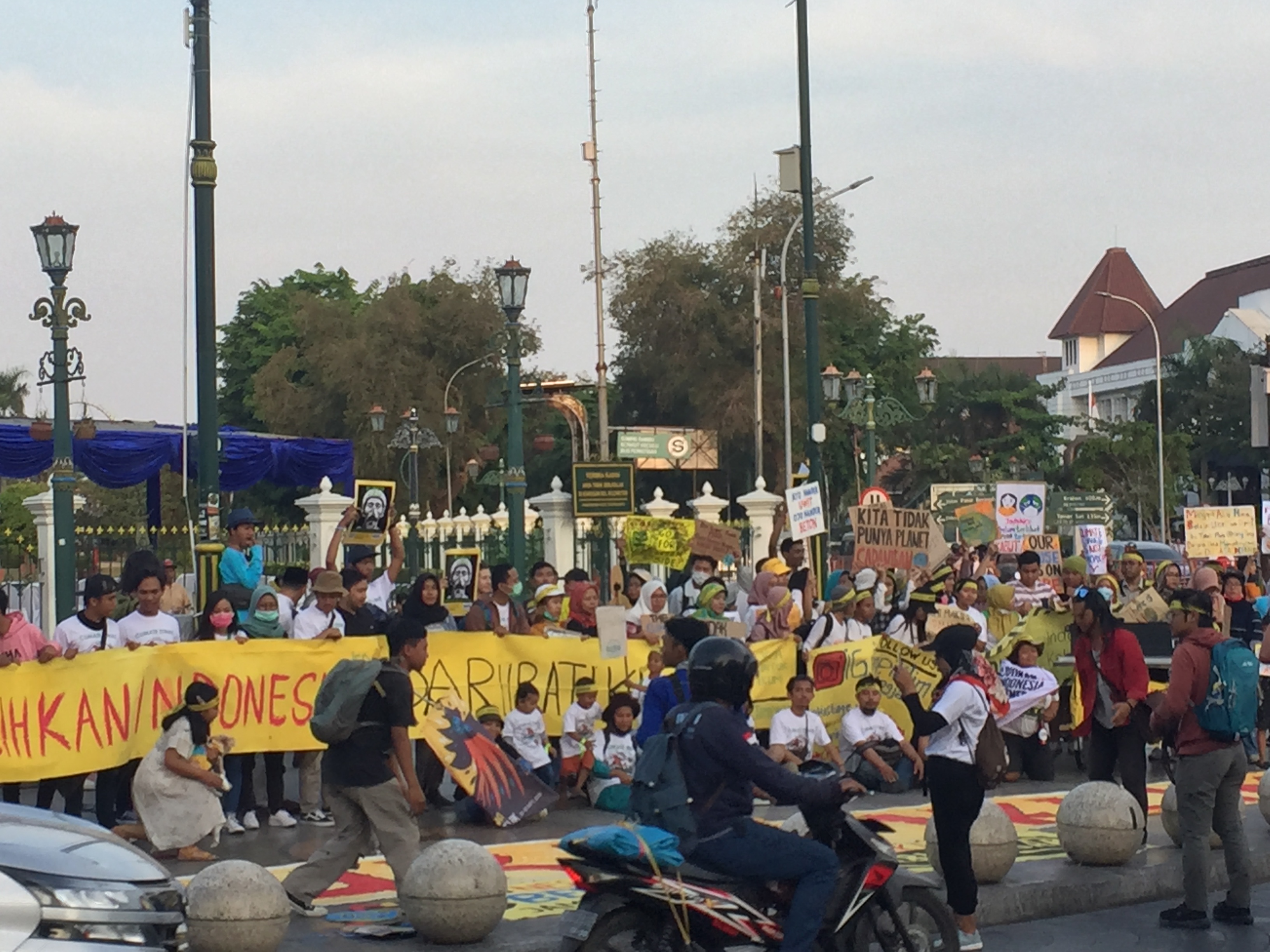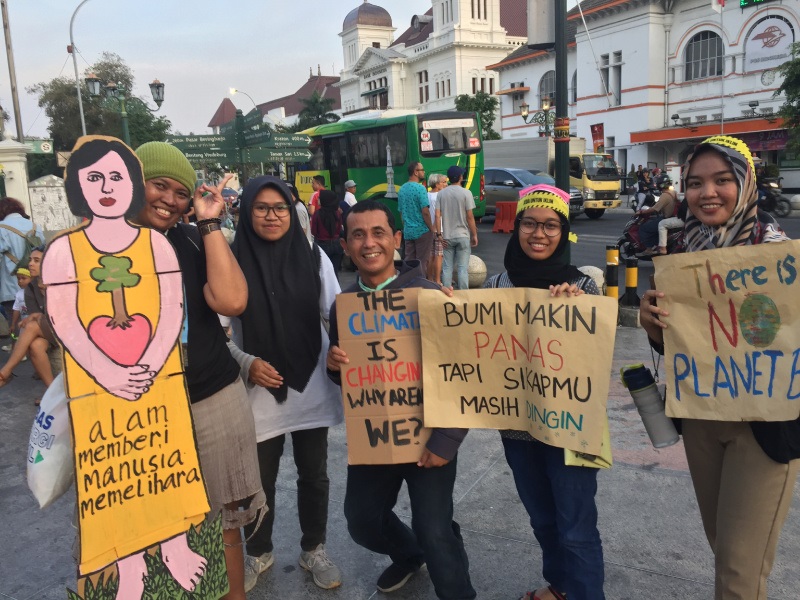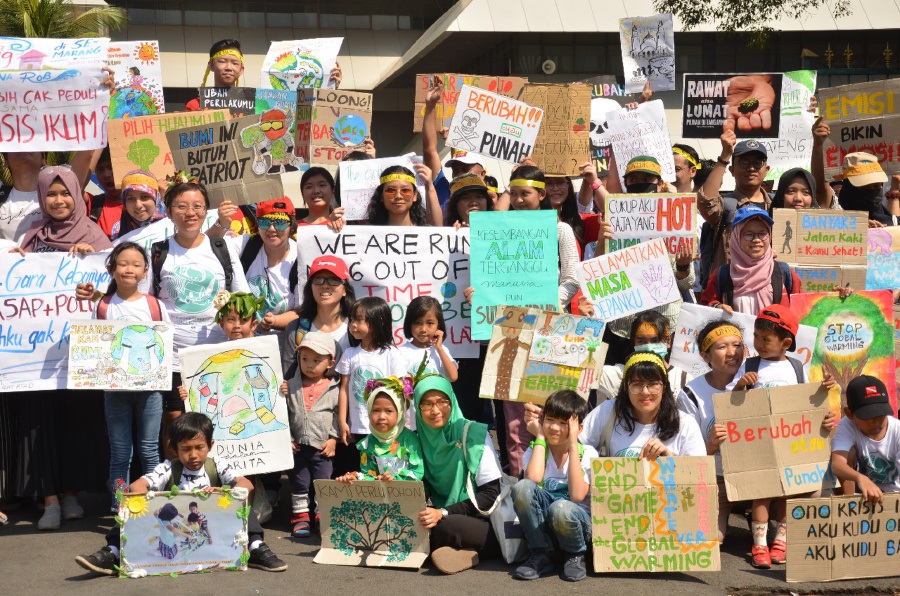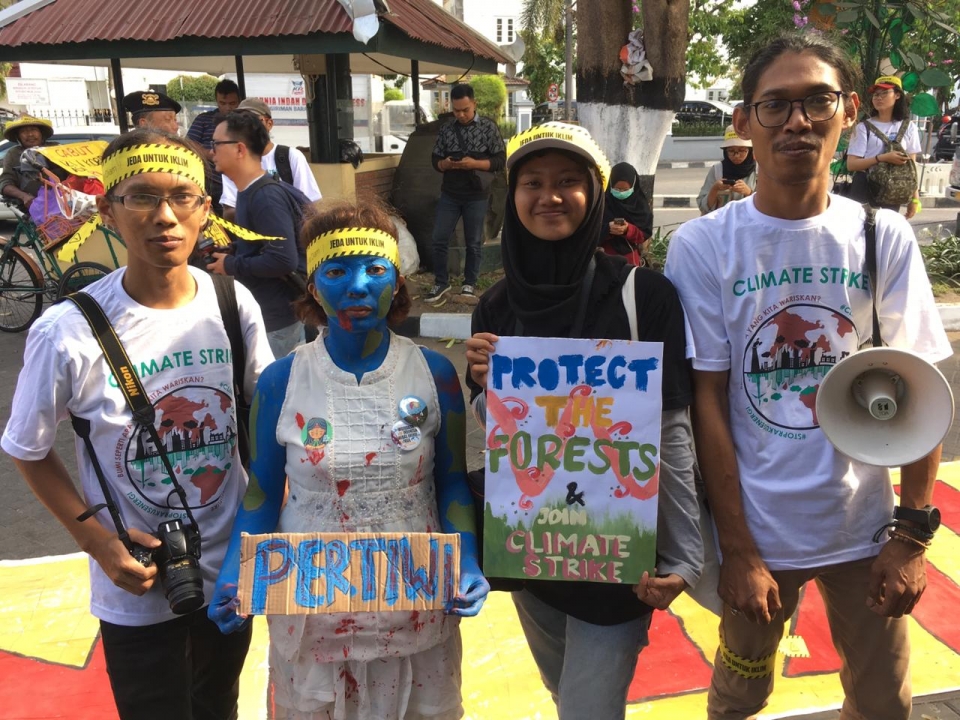
Thich Nhat Hanh, a Buddhist monk and peace activist, tells us “Peace is every step.” It’s a saying that our AFSC Indonesia staff embraces, often reflecting that a holistic peace not only addresses peace between and among people but also between us and the rest of nature.
Our work in Indonesia focuses on supporting partner organizations and communities in building peace by promoting diversity and inclusion. But like everywhere around the world, we are also feeling the growing and manifest effects of environmental destruction all around us, including climate change—an issue that affects all of the communities we work with, regardless of religion or belief.
In West Timor, Marhamah, a 20-year old university student we work with, recently shared this observation with us: “Kupang is getting hotter and hotter, the dry season longer, and the rainy season shorter with less rain. When it does rain, it rains very heavily, causing flooding and landslides—after that, drought and fires. During the dry season, it’s very difficult for farmers, water is scarcer, the harvest has decreased, earnings also have declined, and farmers are poorer.”
Our collective concerns have led us to mobilize to address climate change where we work in West Timor, Aceh, and Yogyakarta in collaboration with partner organizations. Like millions of others around the globe, we also took part in the Global Climate Strike in September, drawing inspiration from Greta Thunberg and many other young leaders worldwide.

Here are some example of how our efforts engaged hundreds of people throughout Indonesia:
In Kupang City, KOMPAK (Kupang Peacemakers) took the lead in bringing together more than 800 youth from 41 different communities into the KupangClimateBreak Network. This network organized several activities starting with “Let’s Talk About the Climate Crisis” coordinated with the Kupang chapter of the Indonesian Forum for the Environment (WALHI) and a “Call to Help the Earth” workshop with the East Nusa Tenggara provincial Environmental Department and the Kupang mayor’s office. Youth created a social media campaign leading up to tree planting at 10 schools involving 500 people as well as a march from the governor’s office to the mayor’s office that ended in a cultural arts performance.
Zarniel Woleka, AFSC program officer for West Timor, said, “Most people already know that something is wrong, that something needs to be done to save the earth but with these activities now feel empowered and motivated to act.”
Ningsi Bunga, a KOMPAK activist added, “Local youth dared to take this on, dared to organize communities and committed to take care of the earth together, including the government which committed to making environmentally friendly policies.”
In Aceh, partners organized a campaign that raised the issue of environmental justice criticizing climate change mitigation projects, including REDD (Reduction of Emissions from Deforestation and Forest Degradation), that affect community livelihoods, involve confiscation of land, and the exclusion of communities from their traditional forests. They also questioned why the “developing” world was being held responsible for the “developed” world’s disproportionate use and exploitation of nature.
“Everyone must realize that the effects of climate change we are feeling now are the result of humankind’s own negligence,” said AFSC Program Coordinator Ruwaida Ismail , who also highlighted the government’s role in “issuing permits for land and resource exploration and use everywhere like a sale.”
AFSC partner Women’s Solidarity Aceh chapter organized a village clean-up involving 40 people, which was led by village women who encouraged sorting and recycling. After the clean-up, women led a discussion on climate change’s disproportionate impact on women. Rahmil Izzati, Women’s Solidarity Aceh’s program coordinator, said, “For village women whose lives very much depend on nature, the global climate crisis has a bigger impact on them when water sources dry up and disappear because their gender roles and responsibility.”
In another village, youth led workshops on environmental destruction and organized open-air movie viewings about plastic waste, a local foods culinary fest, and a mural painting. Students from the State Islamic University organized a beach clean-up with more than 200 people and had a discussion and tree planting, as well.

In Yogyakarta, AFSC and partners, initiated a series of discussions and activities among a broad cross section of activists and communities resulting in a broad network–“People’s Network That Cares About Jogja’s Climate (JAMPIKLIM), which included environmental, animal rights, and feminist activists as well as advocates for indigenous beliefs and even a home schooling community. JAMPIKLIM also organized a public discussion on climate change at the Yogyakarta State Islamic University, a “Fridays for Future” rally at Yogyakarta’s iconic “Zero Kilometer” downtown, and a march featuring prayers by interfaith leaders.
Rona, an environmental activist from Yogyakarta, said, “It’s not only in other places, Yogyakarta is also getting hotter and hotter. Besides drought, the rainy season is also late. Something has changed with the earth and we need to do something.”
These changes are disproportionately felt by women and lower socioeconomic classes, said Sana, chairperson for Women’s Solidarity Kinasih, “There is a limited amount of water. Women have to line up for a long time to bathe and for menstruation cleaning.” She added, “On the whole, women are responsible for the domestic sphere. The impact of climate change is not gender neutral.”
Halik Sandera, executive director of WALHI Yogyakarta chapter, said that the Indonesian government’s “commitment is far from what is hoped for. For example, annual forest fires still happen and this year even worse. Yogyakarta with its tourism industry is one of the biggest energy users and as a student center produces more and more garbage. Plastic waste is found in rivers all over Indonesia, including Yogyakarta. We urge everyone from all walks of life together to preserve the earth as our mutual home.”
In Indonesia it can be difficult to get people to stand up and take action together to explicitly defend freedom of religion or belief. But the environment belongs to everyone, and people working collectively to preserve it cuts across identity in a way that is inclusive and inspiring.
AFSC and partners bring an intentional, intersectional perspective to organizing, making sure that women and religious minorities—including those not recognized by the state--have a prominent role and that their voices are highlighted. Partners also bring their focus on structural injustice and the need for structural change, encouraging youth to see the root causes of environmental destruction.

We look forward to engaging and supporting partners across Indonesia in continuing this vital work.
As Greta Thunberg has reminded us, “the science is clear,” and as Rufus Jones, a Quaker and founding member of AFSC, stated, “In this business of building kingdoms of truth or peace or love in the world, thou must act.” So let’s do it!
